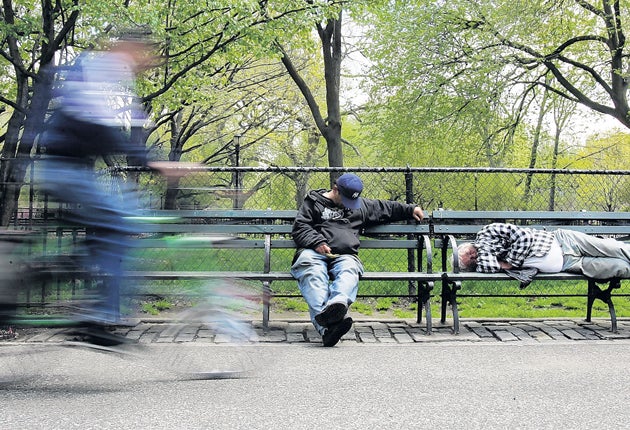Bloomberg's solution to the homeless problem: a one-way ticket out of New York
Mayor has shelled out for tickets to as far away as Paris and Johannesburg

Your support helps us to tell the story
From reproductive rights to climate change to Big Tech, The Independent is on the ground when the story is developing. Whether it's investigating the financials of Elon Musk's pro-Trump PAC or producing our latest documentary, 'The A Word', which shines a light on the American women fighting for reproductive rights, we know how important it is to parse out the facts from the messaging.
At such a critical moment in US history, we need reporters on the ground. Your donation allows us to keep sending journalists to speak to both sides of the story.
The Independent is trusted by Americans across the entire political spectrum. And unlike many other quality news outlets, we choose not to lock Americans out of our reporting and analysis with paywalls. We believe quality journalism should be available to everyone, paid for by those who can afford it.
Your support makes all the difference.New York is experimenting with a bold new way to control the newly expanding homeless rolls. While some might call it a variation of the old, discredited, "on yer bike" approach to dealing with folk on welfare, such a description would not be quite accurate. Better call it "on yer airplane", destination Miami, Paris or, indeed, London.
Officials confirm that under a programme launched in 2007 – but so quietly that almost no one outside the administration of the Mayor Michael Bloomberg was aware of it until now – the city has been buying one-way tickets on whatever means of transport is appropriate, jumbo jets included, for homeless families to get out of Gotham.
It is not that that the city is sending them just anywhere, of course. Instead, when families turn up at the homeless shelter intake centre in the Bronx looking for beds, they are now automatically asked if they have friends or relatives anywhere else in the country – or the world – who might be willing to help. If a distant aunt or uncle is found and persuaded to play along, then the city will pony up the cash for the tickets to get them there.
Officials call it win-win for all sides. So far, 550 families have taken advantage of the offer at a cost to the city of $500,000 (£300,000). They have been put on buses, trains and planes (or even given petrol tokens) to 25 different states across the US and to destinations in five continents. Records acquired by The New York Times show that the city has dispatched families to Paris (at a cost of $6,332), Orlando ($858.40) and even Johannesburg ($2,550.70).
All this, of course, is in an effort to relieve the stresses on a homeless system that is already bursting with almost 10,000 families in its care. And if the tickets can sometimes be expensive, defenders of the programme note keeping just one family in homeless shelters can cost the city as much as $36,000. It's cheaper to get rid of them.
"We want to divert as many families as we can that need assistance," said Vida Chavez-Downes, a city official. "We have paid for visas, we've gone down to the consulate, we've provided letters, we've paid for passports for people to go – anyone who comes through our door."
But not everyone is impressed. Critics assert that the city is trying to sustain an illusion that it is dealing with the homelessness problem and that numbers are falling. But by sending people packing, they are not addressing the causes of the crisis, including the continuing dearth of affordable housing in New York City.
"Anywhere but here," is the mentality, Arnold Cohen, head of Partnership for the Homeless, a leading advocacy group, said yesterday. He likened it to a brief period in the 1990s when the city was buying homeless men one-way bus tickets to leave the city. This is the first such programme for whole families, he says.
Mr Cohen says it is flawed, partly because "the city is not doing real analysis as to whether or not when they give a ticket out of the city to another town – you know, it may be London, right? – they don't know if those offers from relations indeed are sustainable and real. In a short time, those folks can fall in homelessness again and become a burden on that municipality or they might come back to this city".
But if those singled out for this treatment are happy, who can blame them? "I feel very happy because I'm going to be able to get back to do the things that I know how to do," said Hector Correa, headed back home to Puerto Rico.
Join our commenting forum
Join thought-provoking conversations, follow other Independent readers and see their replies
Comments